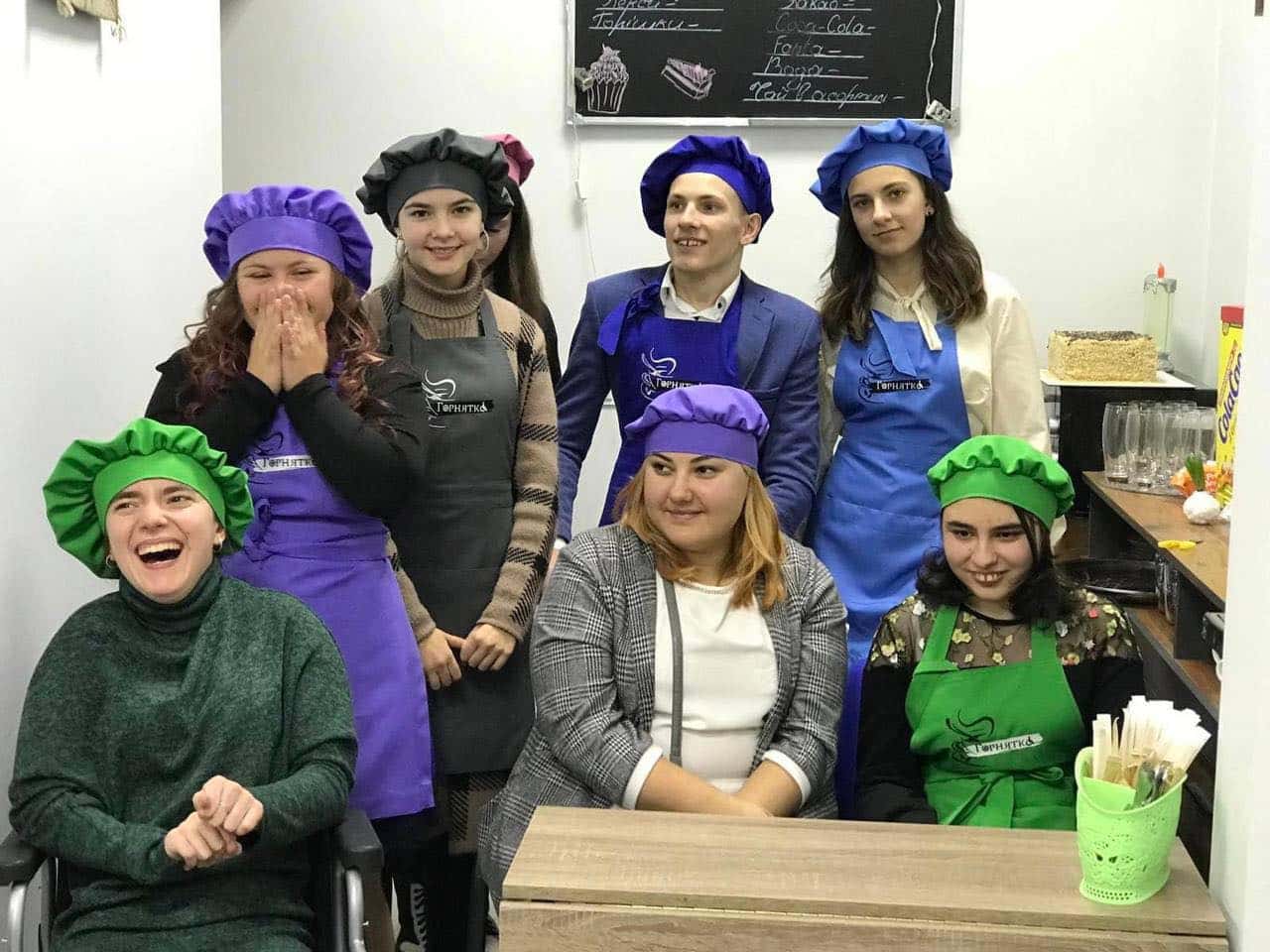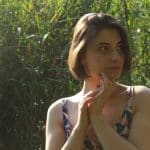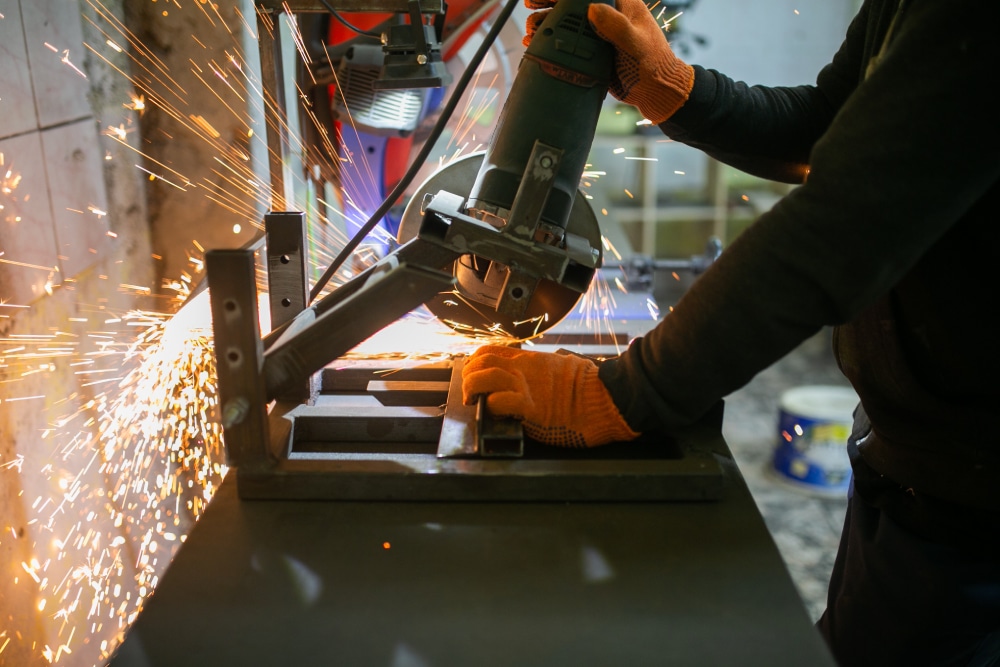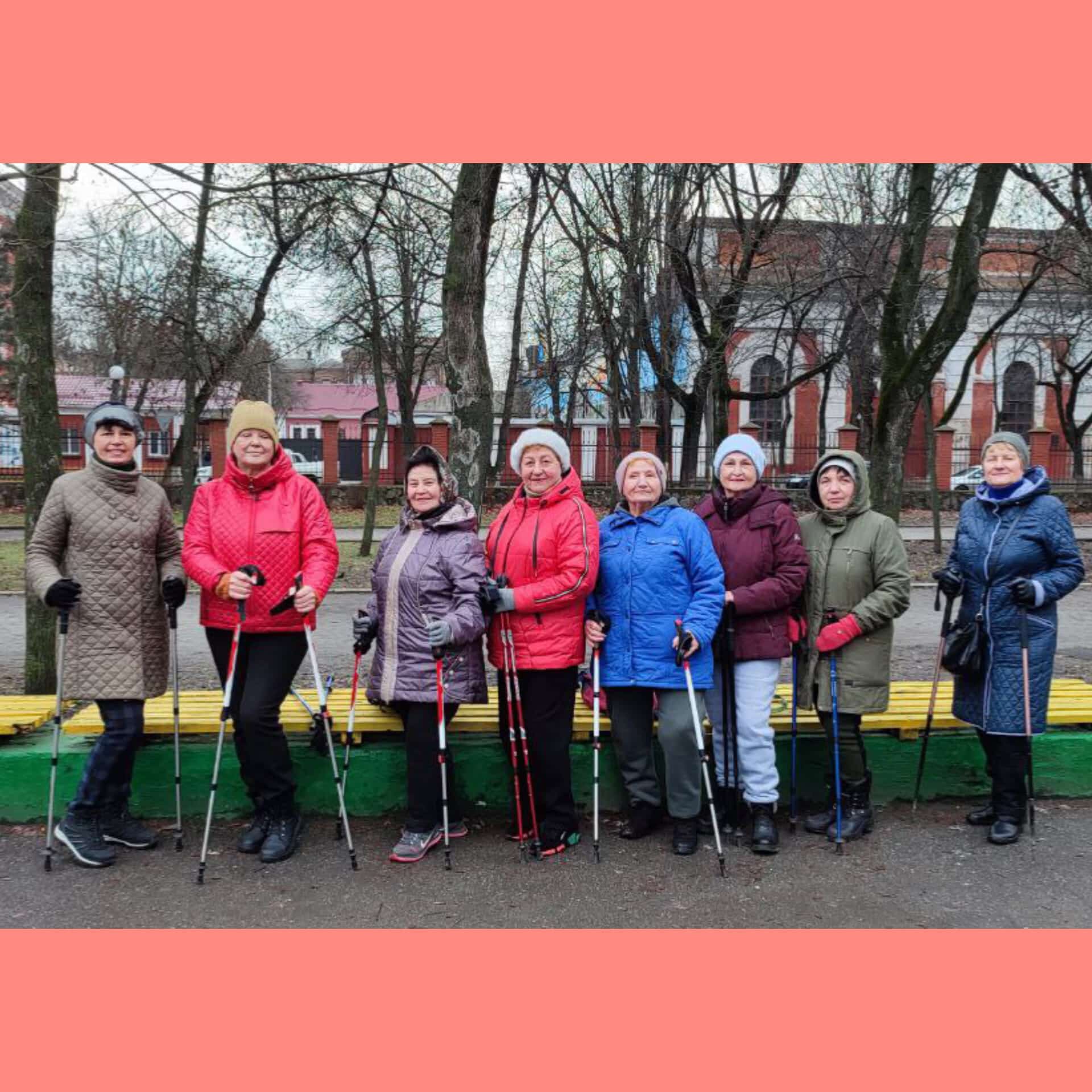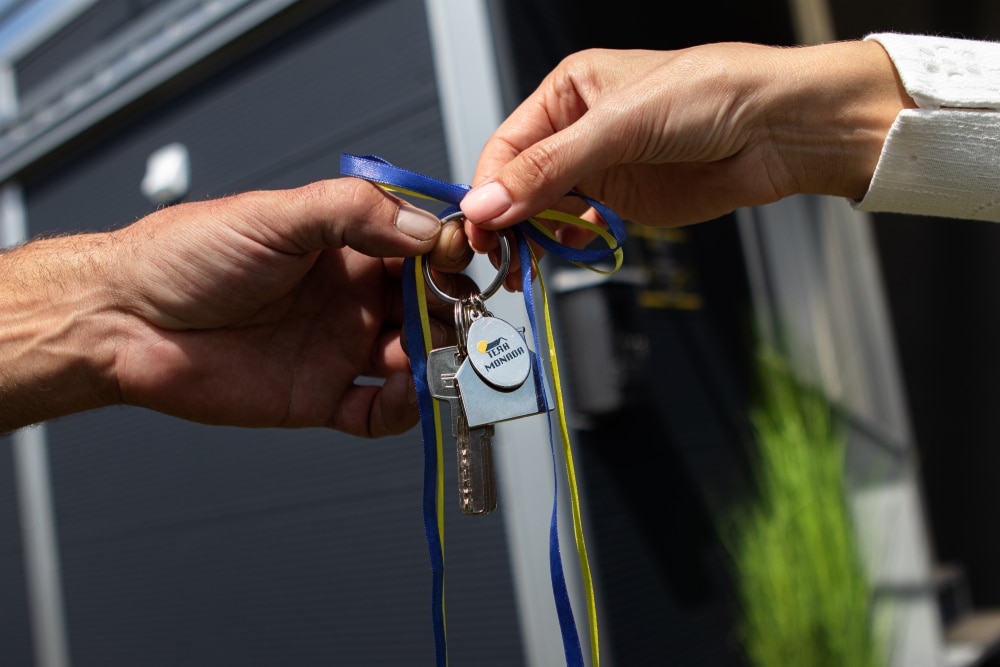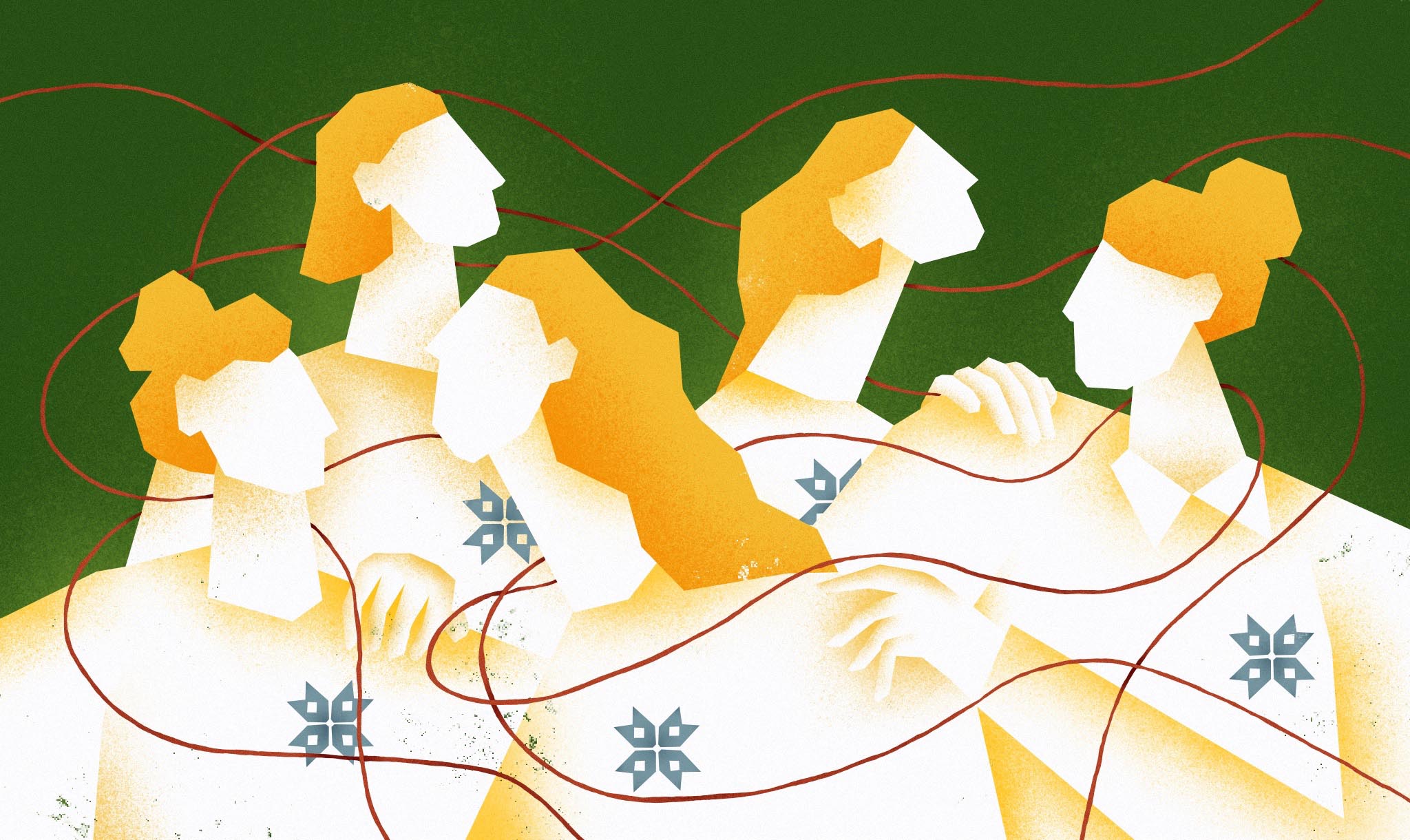Measured pace of life, coffee and homemade goodies. In this cafe you will not see hundreds of guests or a menu offering twenty dishes. However, it is exactly the place where you can feel the awe and love of those who set this place up and who daily greet visitors with an open heart.
We visited a social cafe in Bukovyna province, having tasted local goodies and talked to its founder, Lyudmyla Krestyanikova, about the place, rehabilitation of youths with disabilities and prospects for development.
Pastries with honey and a special atmosphere
The place is full of light, with paintings hanging on the walls and a sufficient number of tables for visitors. Lyudmyla Krestyanikova is one of the founders of the social cafe. She says that its design is not final yet. Volunteers from a local school create paintings to embellish the cafe even more. There is a large flower pot in the form of a coffee cup standing on the floor next to the checkout.
It was bought by Samantha, one of the employees. After seeing this flower pot, she felt that it belonged in the cafe. Stone roses inside the pot draw the attention of visitors. Employees like presenting guests with small flower pots as a memento of visiting the cafe.
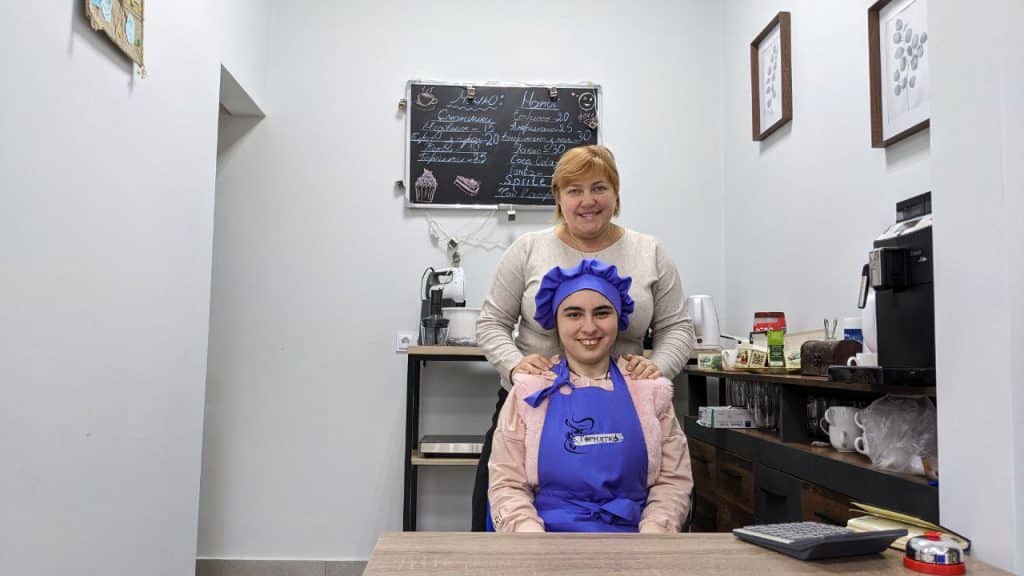
Lyudmyla says the cafe has become the way it is now thanks to each employee having made their own contribution. Some make goodies that are soon sold to customers, while others design a logo featuring on the sign of the cafe and the aprons of its employees. It was Samantha who came up with the design of the logo. Her mom embroidered it on aprons. Samantha is 25. She brews coffee and tea in the cafe. It is not the only job that she has. She also works on the side at ‚Nova Poshta‘ (a private Ukrainian postal and courier company – translator’s note). She works at the cafe whenever an opportunity presents itself.
‚One’s personality is being shaped here. A person becomes independent while honing their motor coordination, memorizing the sequence of actions and assuming responsibility‘, says Lyudmyla.
Every single feature of the cafe was made with love and care. Lyudmyla helps one of the employees named Ivanka tie up the apron, don a cap and make herself comfortable at her working place. Ivanka is 18 and she works here in the cafe. She seems a bit nervous at first, but then she sets about brewing tea, offering us some cookies.
Lyudmyla says Ivanka has become more confident over time. After working in the cafe for 6 weeks, she feels more confident talking to clients, offering them goodies that are on the menu. She advises the visitors on the goodies since she and her mom make some of them themselves. Today she treats guests of the cafe to a freshly made honey cake. Ivanka says she relishes cooking and often lends her mom a hand at home. The girl finds it difficult to walk so she uses special walkers. She puts them aside when sitting down on a wheelchair at the checkout. The cash register and shelves are located low enough so that she can work comfortably.
Ivanka’s mother is one of the founders of the public organization ‚Mrii osoblyvykh ditey‘ (the Ukrainian for ‚Dreams of special children‘ – translator’s note). This organization was promoting the idea of launching the cafe, where youths with disabilities could feel comfortable.
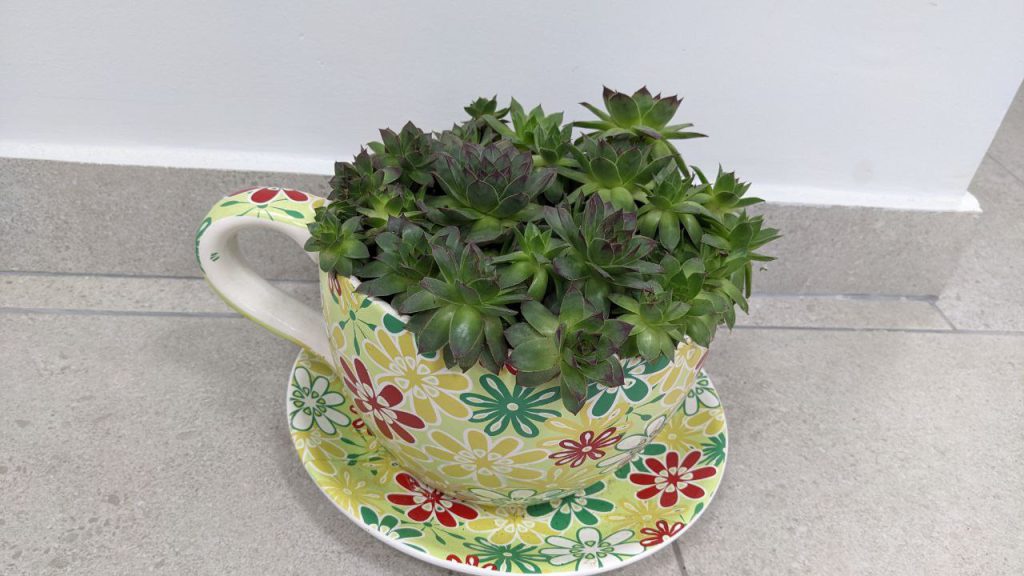
Ivanka brews coffee and tea, making sure that her working place is clean. She also puts dishes together, also serving guests with their orders. At home Ivanka also likes to complete tasks related to cooking: she helps her mom with baking, while also making varenyky (half-moon shaped dumplings that are boiled in salted water, a staple of Ukrainian cuisine – translator’s note). This is Ivanka’s first job and she is happy to be here. She says she cannot wait to come to her workplace every morning.
On the table, which is currently serving as a bar counter (a new one has been ordered that would have a stander with goodies), there is a calculator and a small notebook. Nevertheless, Ivanka did not use the former to calculate the bill.
Lyudmyla stimulates the employees to calculate the bills on their own, so that they can concentrate and train their memory. Ivanka committed all the prices to memory quite quickly. She is now good at billing the clients. Every employee takes down every item they sell every day and then at the end of the week they draw the balance.
Ivanka was having concerns at first about whether she could handle the work. However, she has now grown accustomed to it and is happy to talk to guests.
‚We find it important to provide opportunities for communication, so that kids would be able to socialize and make decisions on their own. They have to be able to take care of themselves‘, Lyudmyla says.
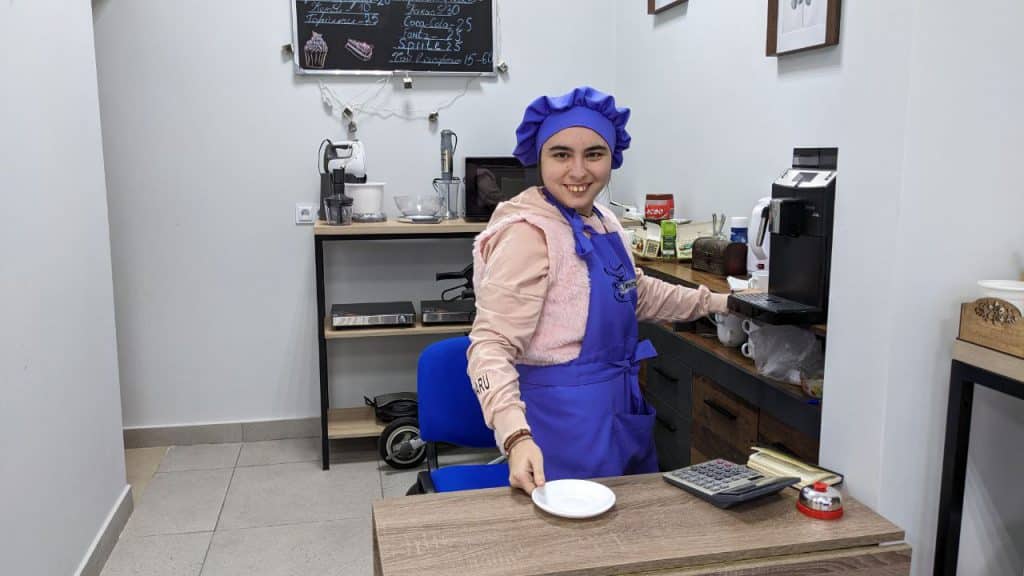
Ivanka says that after 6 weeks of her work in the cafe, it has acquired regular customers. Nearby there is a local plant whose staff members visit the cafe for lunch, also ordering coffee or tea with cookies.
Lyudmyla told us about another guest, a local granny, who comes to Chernivtsi on Fridays to sell milk. A bus stop where she normally waits for the bus is located close to the cafe, so she once dropped by to warm herself up and to drink tea with pastries. She then visited the cafe one more time, bringing goodies for Ivanka. The woman was very grateful for finding a place like this. She wanted to support ‚Hornyatko‘.
‚Dzvinochok’ and a new place
For Ivanka ‚Hornyatko‘ is not the first place for socialization. Before, the girl used to attend the center ‚Dzvinochok‘ (the Ukrainian for ‚a little bell‘ – translator’s note), where children with disabilities undergo rehabilitation in Kitsman (a city in Bukovyna province). She took an active part in masterclasses, e.g., she learned how to bake a pizza at a local coffee shop. Children also gave many performances there, singing and reciting poems.
According to Lyudmyla, ‚Dzvinochok’ is no longer active. The center was shut down, which means that parents and their children with disabilities have now turned to another place, the Center for Complex Rehabilitation of children with disabilities called ‚Dopomoha Zhyttiu‘ (the Ukrainian for ‚helping to live‘ – translator’s note), located in the Mamay territorial community. Lyudmyla Krestyanikova has become its head. She continues working there.
‚I have been active in this field for 20 years now. ‚Dzvinochok‘ is the first rehabilitation center for children with disabilities in Bukovyna province. I knew… We know that there are people with disabilities living among us, but we rarely get to see them since they do not have the opportunity to go to any places. However, a change has taken place’, says Lyudmyla.
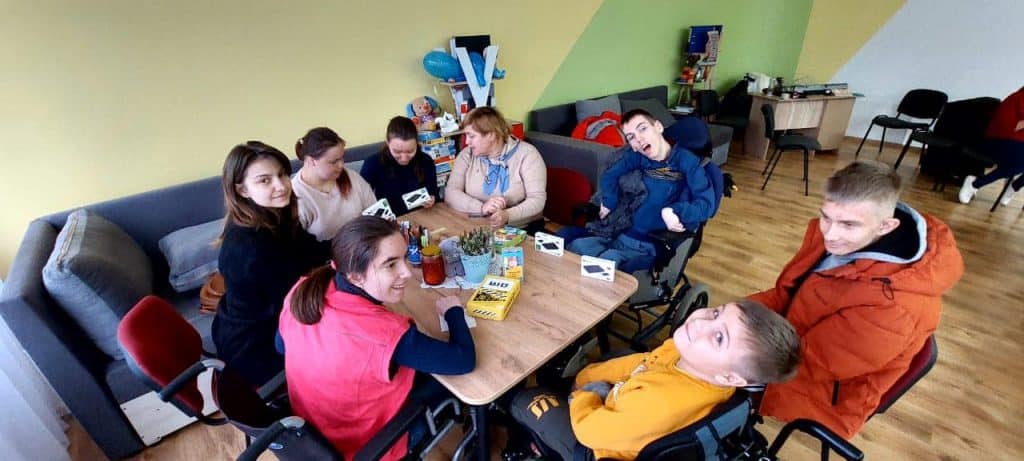
‚Hornyatko’ is only the beginning of ambitious plans. The local territorial community has already embarked upon arranging a large rehabilitation center.
‚This has to be a powerful institution. Professional services of physical rehabilitation will be provided. Physical therapists will work here, as well as physical training instructors. We clearly understand that we also have to be dealing with social and professional rehabilitation. Every young person sees their future somewhere. Someone wants to be a barista, while others are into sewing or IT technologies. Considering this we are planning to open up a few locations or offices where kids will be able to acquire relevant skills’, Lyudmyla says.
Two other organizations share space together with the cafe, namely the municipal Center for complex rehabilitation of children with disabilities ‚Dopomoha zhyttiu‘ (the Ukrainian for ‘helping life’ – translator’s note) and the public organization founded by parents of children with disabilities ‚Mrii osoblyvykh ditey‘. Lyudmyla is one of the co-founders of this organization.
Children were offered not only rehabilitation services at ‚Dzvinochok‘, but they were also entertained there.
‚We give performances with kids. Some of them use walkers, some are in wheelchairs, while others run or spin around. There are kids with autism, but we all take the stage. These performances demonstrate to other people that kids with disabilities are capable of some things. Our shows help kids assert themselves, while making their parents really proud, since they love them so much’, Lyudmyla says.
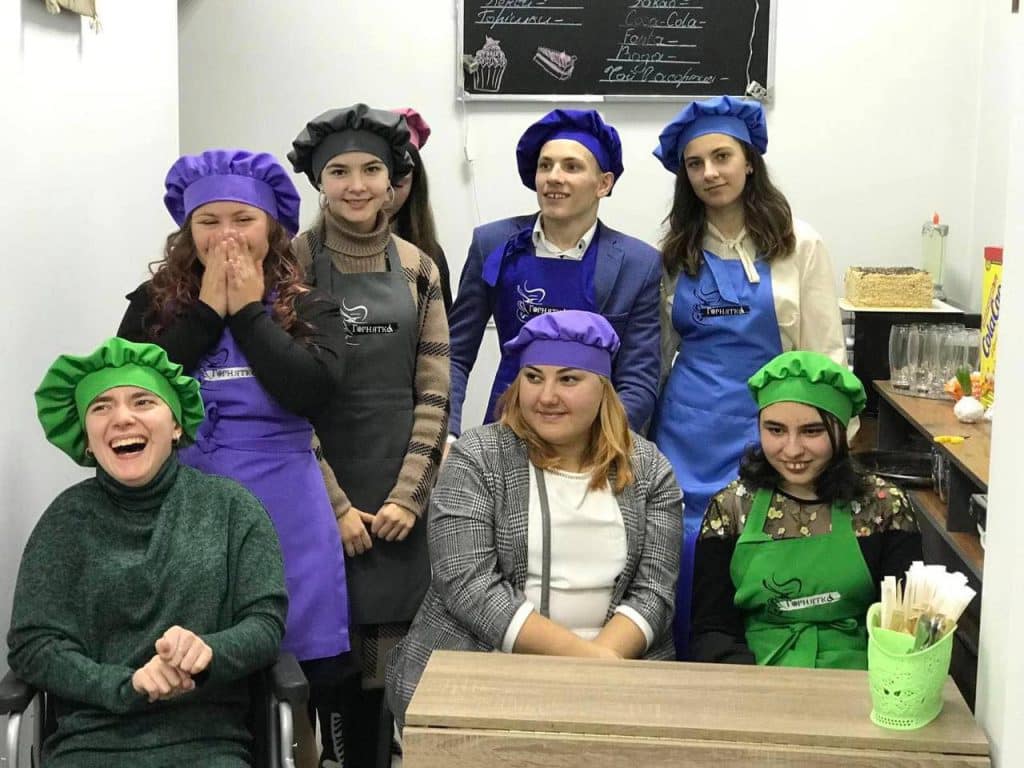
The performances did not stop, although ‚Dzvinochok‘ no longer functions. In a new place Lyudmyla and the children from the center sang carols at Christmas. They were joined by people living in a shelter for IDPs (almost 30 people). To sing their carols they all visited local enterprises, a church, taking also a trip to Chernivtsi. Lyudmila says everyone was thrilled by the process, both carol singers and their hosts.
‚At first everyone was giving us sympathetic looks, but somewhere in the middle of our performance their emotions gave way to their being happy about us being so cool. Lots of people saw that the kids were able to learn carols by heart, recite a poem, crack a joke or sing a carol. Our performance lasted 30 minutes. We sang 4 full carols, recited poems, sang a song and wished everyone a happy New Year’.
Believing in oneself
Members of the community take a vivid interest in ‚Hornyatko’s‘ activities, frequently dropping by to support the cafe. This is the first social cafe in Bukovyna province. It is located in the center of the city so that everyone can come along to have a chat with boys and girls.
‚There is a fine line of perception. Everyone knows that there are people with disabilities in society, but as soon as we see them, we tend to look away‘, Lyudmyla says.
She has been working with children with disabilities all her life, so she knows how others perceive them.
‚Our kids are almost always at home, not having the opportunity to communicate with others. One has to be socially brave to be able to make friends with disabilities‘, Lyudmyla says.
All children (they are now young adults) working in the cafe have their own stories. For instance, Ivanka studied at home, which means she lacked socialization. Her social network consisted of her family and friends at ‚Dzvinichok‘. Vitaliy used to attend a regular school. His mom, Tamara, would take him there every day. Vitaliy has cerebral palsy, so he moves around on a wheelchair. He is now 19, studying foreign languages at university, dreaming of becoming an interpreter. He works in the cafe in his spare time.
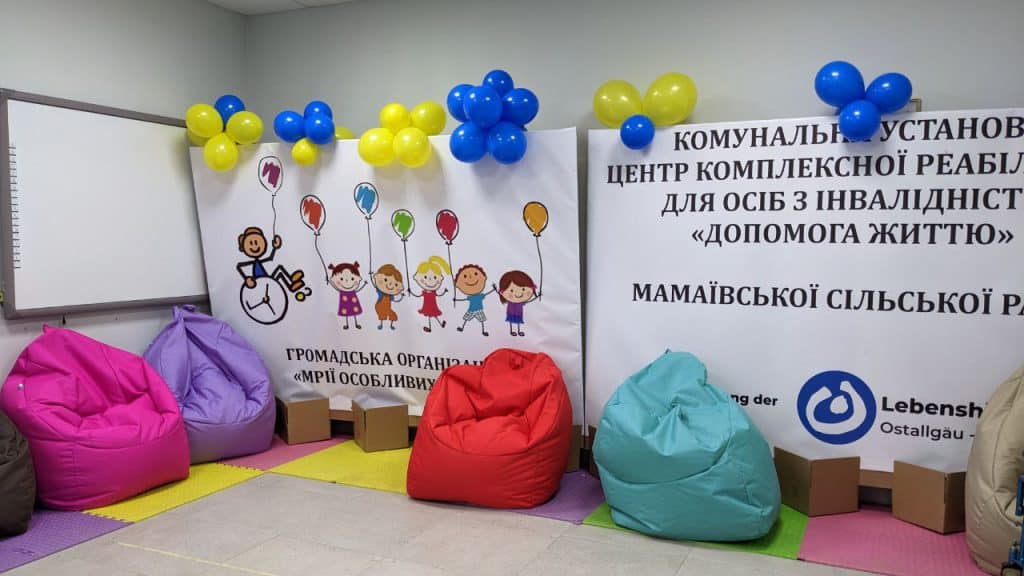
Lyudmyla believes that the social cafe ‚Hornyatko‘ is not about doing business, it is rather about trying one’s hand at exercising a profession. Proceeds from sold tea, coffee and goodies are invested in purchasing food to keep the cafe afloat. Its employees are paid their remuneration by the public organization ‚Mrii osoblyvykh ditey‘. Lawyers are making sure that the cafe works legally. Therefore, ‚Hornyatko‘ has only begun its journey.
‚All this is for kids, so that they know how to do it. Our social cafe gives them the opportunity to feel human, to know that they are real personalities and that they can be useful for themselves and the country. They can learn to be independent‘, Lyudmyla says.
Making children’s dreams come true
Tamara Khashcheva joins our conversation. Her 19-year-old son, Vitaliy, who has cerebral palsy, has enrolled at university. Tamara speaks about ‚Mrii osoblyvykh ditey‘. She is one of its co-founders. 6 parents from Kitsman, Vytylivka and Mamayivtsi (cities in Bukovyna province – translator’s note) united themselves back in 2019 to set up the organization and make the lives of their children better. The parents knew one another back from the ‚Dzvinochok‘ times in Kitsman.
‚While our kids were little, all of us knew where to get medicines, or how to take care of children, but after they have grown up, it has become more difficult. When kids like ours turn 18, there is no place for them to be treated, no place to go to’, Tamara says.
She speaks about her son with much pride, for she knows that Vitaliy is pursuing his goal, studying to be an interpreter.
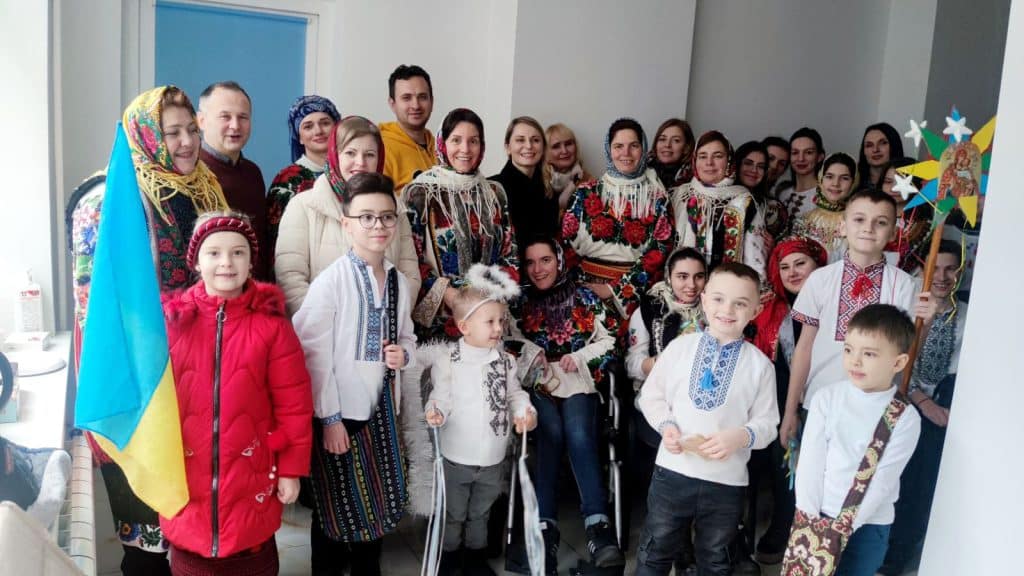
Tamara recalls running an interesting project, when children traveled abroad without their parents, accompanied only by teachers. This was an important step towards independence, as children would fly on a plane, stay in hotels and learn with other children with disabilities from different countries. Ivanka took both of such trips, one to the Greek island of Thasos and the other one to Poland. Lyudmyla was also there. She says that Ivanka was on her best behavior. Apart from participating in all activities, she was staying on the second floor of the hotel, so she had to descend the stairs every time she wanted to leave her room. Currently she is learning how to use an electric scooter.
A few minutes later, another woman enters the cafe. This is the head and co-founder of the organization, Svitlana Burak. She joins our conversation, agreeing with Tamara on the fact that children with disabilities under 18 can participate in a multitude of activities. There are also rehabilitation procedures, but with time things get more complicated.
‚Once our children reach the age of 18, one gets this feeling that their life comes to an end. Some have the opportunity to study, while others don’t. Some kids are not able to take care of themselves, at the same time willing to be part of society. My son, Roman, can neither study nor take care of himself. But he does want to be part of society, see people and communicate with them’, Svitlana says.
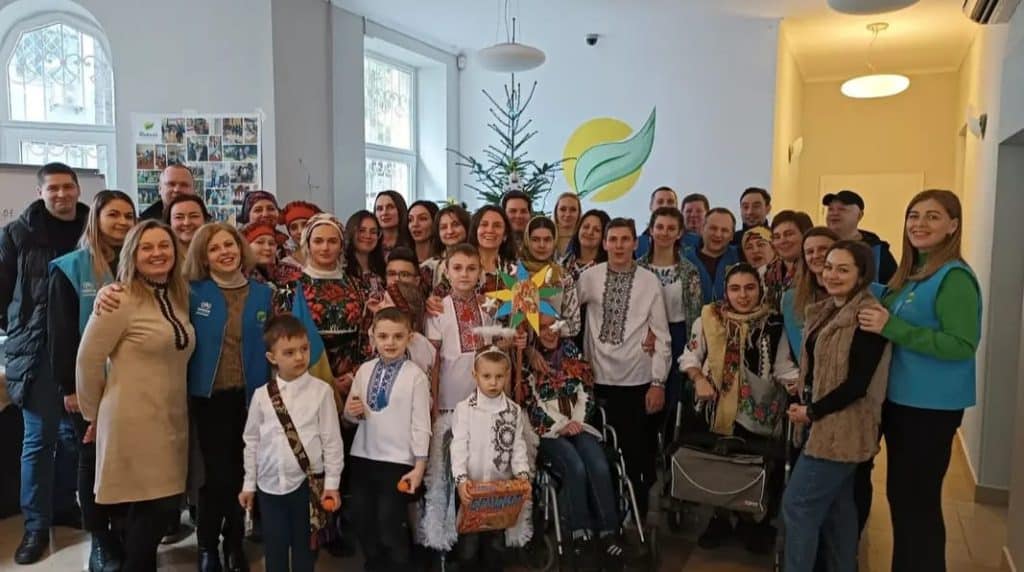
Roman is 20 and he cannot talk. However, this does not stop him from being among people. Other employees of the cafe call him ‚administrator‘. Despite his being unable to speak, he diligently controls the working process at the cafe, reminding others to switch off lights or the coffee machine. Svitlana says that he even controls her every time she forgets her phone at home. He communicates with glances or sounds.
According to Svitlana, she and other parents started working on setting a social cafe up because they understood that their children were regressing at home. For example, Roman would always spend time playing on the computer or tablet. There were also children who were regressing in terms of psychological development.
‚There are children who withdraw into themselves and don’t want to talk. War has instilled many new fears into them, their inner feelings reflect on their psychological condition‘, Lyudmyla says.
At 12 Ivanka was so shy that she could barely talk in public. She would lower her head and remain silent. She now likes talking to others, and more importantly, she believes in herself.
You can either visit or support ‚Hornyatko‘ at the following address: the township of Luzhany (Mamayiv territorial community), Centralna street 47a, Chernivtsi province.

